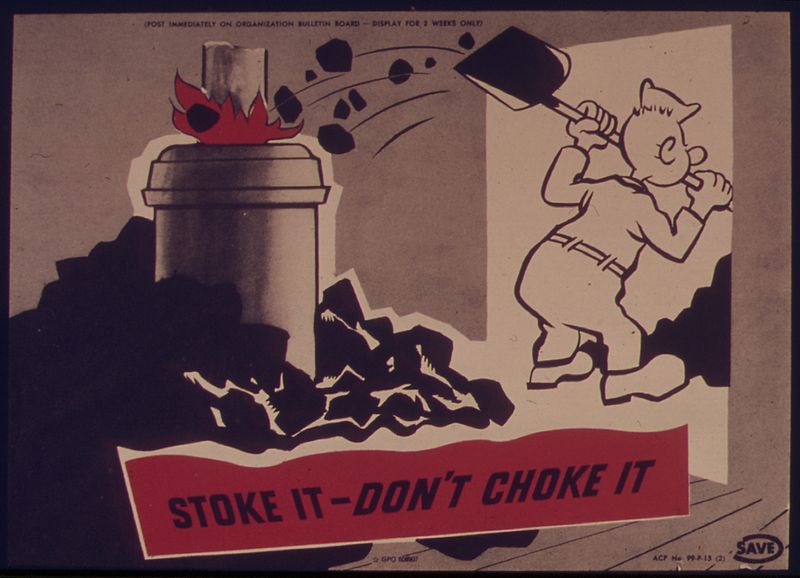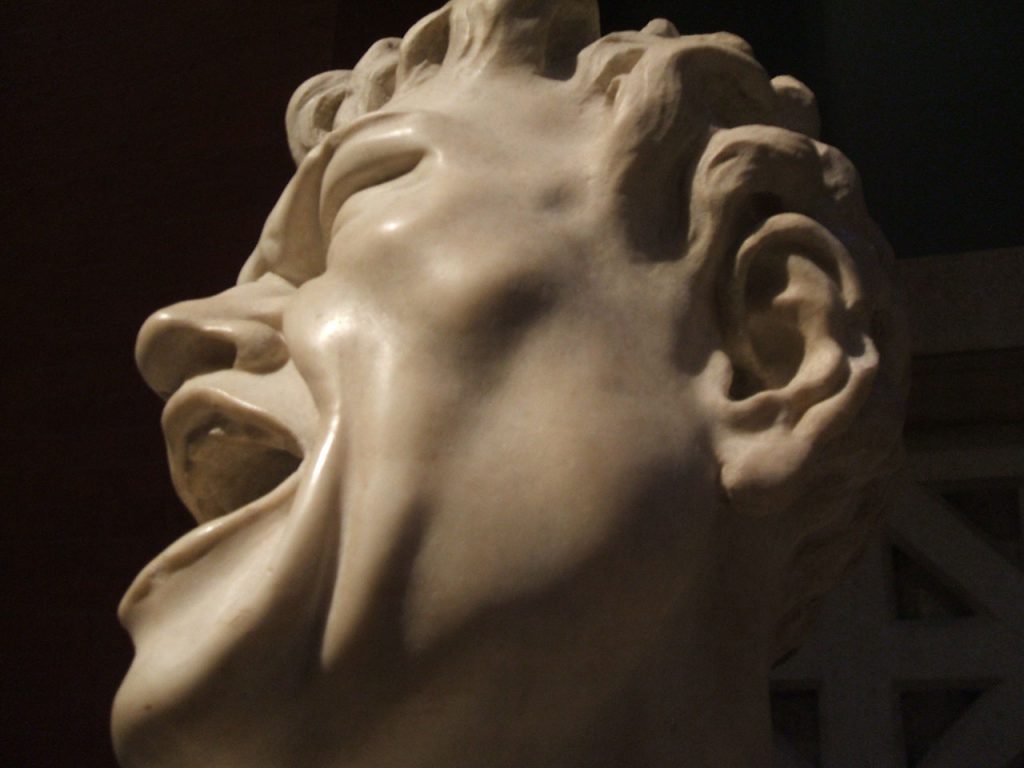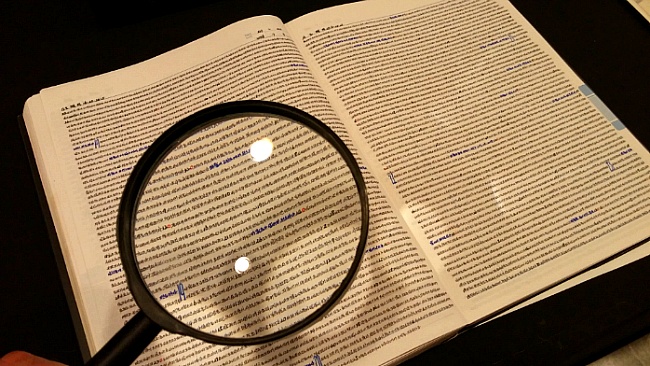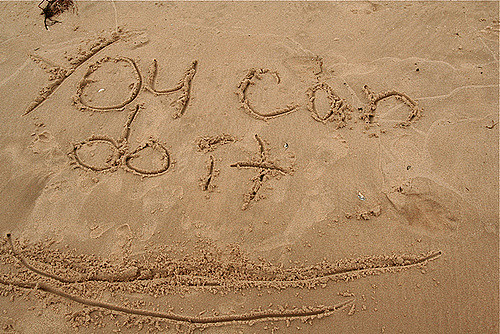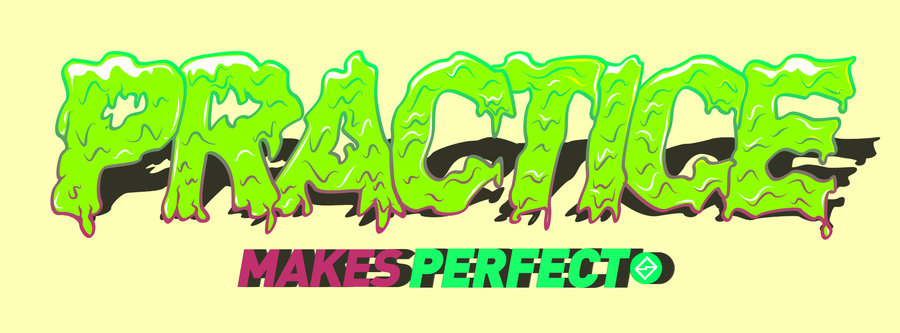So you’ve finally made it. You’re at the final stage of your doctoral journey and are staring down the dragon guarding the treasure you’ve spent the past three to eight to even twelve years dreaming of during those long nights of dissertation or thesis writing. You’re about to begin defending the study that you’ve poured your, heart, soul, and bank account into developing. And you’re just a few breaths away from becoming Dr. So-and-So, which is going to go a long way to impressing and perhaps shutting up your present/future in-laws. Needless to say, the last thing you want to do right now is choke.
And we’re not going to lie to you. Sometimes the approval of a study is entirely contingent upon a good defense presentation. There’s no such thing as a perfect study. Even if the methodology has been established perfectly, and everything from your research questions to your purpose and problem statements is in perfect alignment, there’s always going to be room for someone on your committee to grill you about a specific aspect of your work.
In other words, there will always be chinks in the armor for those with a critical lens. The question is: Do you know where the weak points of your study are, and do you know how to defend them in a professional doctoral defense format? Seems like you might need some dissertation consulting.
Even if you have some experience in public speaking and formal presentations, this kind of endeavor can be a challenge–whether it’s live or through Skype or another video chat platform. For instance, you could be a regular JFK when it comes to addressing an audience, but in order for a dissertation defense to be successful, there has to be a balance of style and substance. No amount of oratory flair and tongue wagging is going to be able to ward off logical discrepancies relating to the structure of your qualitative research design.
Furthermore, during the dissertation defense, you might even have some members of your committee pointing out issues with minutely flawed details. For instance, you might have a particularly punctilious chair, who’s quite keen on having absolutely perfect grammar and style. How are you going to address your committee when they pick an individual line and state an objection?
Furthermore, what if you’re not the best public speaker in the world? What if you tend to freeze up whenever dealing with the pressure to perform? The fear of public speaking is right up there with spiders. That means that if the concept of public speaking could manifest itself in physical form in your bathroom, roughly 30% of you, our dear readers, would scream and frantically try killing it with a sandal.
According to the University of Pittsburgh, most people experience some form of speech anxiety.
In fact, public speaking is many people’s greatest fear. Speech anxiety can range from a slight feeling of “nerves” to a nearly incapacitating fear. Some of the most common symptoms of speech anxiety are: shaking, sweating, butterflies in the stomach, dry mouth, rapid heartbeat, and squeaky voice. Although it is often impossible to completely eliminate speech anxiety there are a variety of ways to deal with it and even make it work to your advantage.
This may have been something you’ve dealt with all your life, so how are you going to get through it come time for your formal qualitative research dissertation defense?
We’re not trying to induce any unnecessary anxiety here, though we are probably doing a good job at it. What we are trying to do is to spell out why the dissertation defense is something that can’t be ignored as a potential stumbling block on your way to graduation. Indeed, there are plenty of doctoral candidates who approach their defense as if it’s just a rite of passage–a formality. And it is that to some degree (though maybe of the Klingon variety). But most universities take this defense very seriously, and you can be sure that, if your professors are going to take a few hours out of their week to dedicate their attention to your statistical analysis, that they’re going to scrutinize every detail.
So what do you do if you’re in this type of scenario–i.e., you have an upcoming doctoral defense? Well, you can just disenroll and decide that those eight years you spent working on your study on the drinking habits of rural people in Generation X were just a waste of time (Why didn’t I focus on Generation Y?!?). Or you can buck up and learn exactly what you need to do in order to make your defense a smashing success.
The best advice we can give you right here at the beginning is never to go at anything in your doctoral program alone. After all, education is all about learning your way to your best self–and, unless you’re a supreme autodidact (and in that case, why are you going to school), you’re going to have to rely on the lessons of other people to get to the next stage of your journey (aka, out of graduate school and on with your life; hopefully, there will be a yacht in your future.
That said, we’ve asked our dissertation consultants to compile a list of all of the best dissertation defense tips we know of to make sure you ace this all-important test on your road to fame and fortune. Get ready for our top tips for getting through the dissertation defense process.
Learn to Present with Style
As discussed, even though you may not be pursuing a degree in public speaking, getting through your dissertation defense is worth doing some research into the best techniques for wowing your audience. After all, you don’t want the culmination of almost a decade of work to seem like a Ben Stein lecture. The last thing your chair wants to see at such a pivotal stage in your doctoral program is someone who looks like they’re just going through the motions. You should be projecting passion and knowledge throughout the presentation, and there are some easy ways to accomplish this–even if you aren’t a public speaker.
For instance, you might think that your defense of your statistical analysis is all about showcasing a proper methodology, along with accurate results. And, to some extent, it is. However, if your committee was solely interested in the facts and figures behind your work, it’s all right there in black and white. Indeed, as discussed previously, even though the defense itself bears a lot of weight in terms of whether you’re able to graduate successfully, there’s also a somewhat ceremonial quality to the dissertation defense. In other words, it’s almost like a critical celebration of your achievement. You’re like the host of an awards ceremony. All eyes are on you, and, as such, this can either turn into a panache-filled evening of fun, or an off-the-rails disaster that everyone is talking about the next day.
So, while we always preach substance over style, you should know that your dissertation defense is an inherently style-forward component of your doctoral work. It’s a presentation, after all, and you remember just how effective a little glue and glitter were when it came to getting passing grades in elementary school. That said, here are a few adult equivalents of those tools to help you during your presentation.
-
Never Forget the Human Element
As discussed, it’s easy for researchers to get lost in the facts and figures of their work. However, when it comes time to present, you need to remember the practical purpose of why you’ve conducted this quantitative and/or qualitative research in the first place. You’re the storyteller of your study in this scenario, and, as such, you should place the conflict that your study is addressing at the forefront. The following questions should give you a good idea of how to structure your presentation to place the human element far forward: What is the problem? What do we not know? Why is this important? What are you doing to fix this problem? How did you do it? Why did you do it that way? What were the results? Why are those results important? What should we do now?
Remember that, even though your committee will be fluent in all of the nitty-gritty elements of your research design, having a clear narrative of the problem v. solution dynamic of your research is never a bad thing and will ultimately lead to a more compelling presentation.
-
Rehearse and Speak Assertively
Researching public speaking techniques is a good idea, and we definitely recommend that you do a few practice defenses before the real thing. In fact, we regularly conduct comprehensive mock defenses for students all across the U.S. and abroad, and we’d be happy to allot some time to put you through a practice run so that you’re fully prepared for the real thing.
However, if you’re not a public speaker, don’t rush full-boar into trying to learn and implement every public speaking technique in the book after a two-week crash course. Otherwise, you’ll risk looking like this guy.
Instead, take experts’ advice into consideration, and remember to speak assertively whenever you’re presenting your ideas. As long as you speak clearly and according to your script, you’re on the right path.
- Stay Calm
This might be difficult, especially given the importance of the defense and its bearing on your entire academic career… Okay, sorry, not helping. In all seriousness, it’s important to stay calm throughout your defense. The best way to do this is to remember that all of the ammunition you need is right there in your study. If you’re at this point in the process, it’s unlikely that there’s a question regarding your methodology and findings that you can’t answer. If you do encounter a question that leaves you at a loss, calmly respond that you don’t know. Don’t allow yourself to become frazzled, as this will only exacerbate your vulnerability in front of your audience. You got this. Already have you that which you need!
Drill and Have Your Materials Ready
You didn’t get to this point in your educational career alone, and you’re not going to get out of it alone either. Especially if you’re new to the process, the last thing you want to do is go solo and expect that you’ll be fine without any advice or consultation from experts.
For instance, when you’re preparing for your defense, it’s very likely that you’ll need to put together a PowerPoint presentation that distills the main points of your study into compelling slides. If you’re unfamiliar with PowerPoint, or if you’d prefer to spend your time in the lead-up to the defense preparing to answer the questions of your committee, we highly recommend consulting with a dissertation coach to help you develop these materials. Many dissertation coaches (like the ones who work here at Precision Consulting) can not only provide you with help on your PowerPoint slides but they can also help you with the composition of your speaker notes, which will be instrumental in streamlining your presentation for your committee.
This also adds a layer of protection if you’re a bit nervous about your performance as a public speaker, as you can always stick to the script if you feel like you’re wavering. Furthermore, we know that one of the most common pitfalls for students facing their dissertation defense is the dread of not having enough material to go on. Indeed, many students will often underestimate the length of their presentation, which will lead to an awkward “Is that it? Moment after you find that the slideshow you’ve developed was only enough material for roughly five minutes of actual speaking. Working with a qualified expert to develop your presentation, however, is a surefire way to avoid this kind of misfortune, as a dissertation coach will always have a handle on the proper and expected length for any given dissertation defense.
We also highly recommend that you drill your presentation with someone who’s familiar with the ins and outs of the dissertation process. Although it’s always a great idea to run your presentation by your colleagues (even your friends and family), this won’t give you the best idea of what to expect during the real thing. Indeed, while it will definitely help you if you have some difficulty with public speaking, you’re going to need someone on your side who can simulate, with complete accuracy, all of the nuances of a formal university defense.
This, of course, is another area where working with a dissertation coach can help you, as we’ll be able to run you through a complete mock defense, completely in line with your university’s standards. Thus, not only will you have the benefit of experiencing the pressure of having your work viewed through a critical lens, you’ll have more of an idea of the questions your work will raise among your reviewers once it’s time for the real thing.
Thus, there are three questions you need to ask yourself before making sure you have all of the materials you need for a successful dissertation defense:
- Do I have a professional PowerPoint presentation, and is it long enough to take me through my entire presentation?
- Do I have speaker notes to guide me through my presentation so I don’t mess up?
- Have I practiced my defense presentation to the point that I feel confident answering my committee’s questions?
Once you’ve answered these questions, you’re going to be set up for success. And, as always, it’s important to establish a support system throughout this process, so you’ll know that, no matter what, you won’t have to face this challenge alone.
Don’t Make Amateur Mistakes
You’re about to defend your statistical analysis or qualitative research, so it’s safe to say that you’re not new to the academic world. However, sometimes–whether it’s due to overconfidence or just being burnt out after all of those years of work–even seasoned veterans can lose sight of the tried and true methods that got them this far. You’re so close to being finished, but don’t think that you’re immune from the consequences of making amateur mistakes. These can delay your graduation, which can result in you spending even more time and tuition waiting for the big day…all over again.
For instance, make sure that before your dissertation defense date you’re getting enough sleep. Sure, we often extol the virtues of burning the candle at both ends in order to complete our papers on time, but this kind of overexertion can definitely put a damper on your performance when you’re up in front of your committee. So many people dismiss the effects of sleep deprivation, when it’s impact on your mental acuity can indeed be quite profound.
In fact, if sleep deprivation becomes too much of an issue (as it often does for people enrolled in doctoral programs), you can even experience things like delirium, which can significantly impair your ability to develop a cogent argument. LiveScience sums it up as such by describing instances where delirium formed in ICU patients due to a lack of sleep:
True delirium occurs when a person becomes completely disoriented, Feinsilver said. “Sleep can play a role in that,” he said.
Patients who have been hospitalized in intensive care units — where lights and sounds may continue all day and night — can develop a condition that doctors call “ICU delirium,” he said. And while it’s unclear if sleep deprivation is the cause of this delirium, doctors do think that loss of sleep is one reason people in the hospital for extended periods develop bizarre behavior, he said.
The worst thing you can do for sleep is put someone is a hospital, Feinsilver added. It’s fairly common for for hospitalized patients to develop insomnia, he said.
Aside from getting enough sleep, nutrition and hydration are also extremely important. You don’t want to defend your dissertation on an empty stomach. And, likewise, you don’t want to defend your dissertation having just gorged yourself on a Five Guys double cheeseburger (unless that’s just really your thing).
Remember the basics. Consider yourself an academic athlete, and know ahead of time what you need to do in order to be your best self. If you tend to think better after going on a morning jog, do that. Whatever rituals have worked for you in the past, now is definitely not the time to break those good habits.
Needless to say, if you’re thinking about having an all-nighter before your dissertation defense, just…don’t. We’ve heard all too many horror stories from students who celebrated their graduation prematurely–resulting in everything from sleeping through the scheduled time to appearing visibly hungover during the presentation itself. We even had a student discussing an ordeal in which he was expressly asked by his committee if he had been drinking the night before during his defense. This is, of course, not where you want to be, as universities have their own way of throwing you in the drunk tank. It’s called another year of redoing your statistical analysis from scratch. Yikes! You’re definitely better off relying on a dissertation coach.
Conclusion
You’ve been building toward this moment for years, so make sure that you have everything lined up the way you want it. Fortunately, the hard work is all behind you, but dismissing the dissertation defense as a given approval is a mistake that too many students make.
Again, make sure that you’re set up for success by consulting with a professional dissertation coach who can help you develop each component of your defense preparation. This way, you won’t leave anything to chance.
Just give us a call anytime at 646.553.4730 or email us at info@precisionconsultingcompany.com for some one-on-one help with a dissertation consultant, a thesis writer, or even a statistician. Our experts in statistics, literature, and qualitative research and analysis will be happy to assist, whether it’s through an editing service or through a qualitative analysis of your current topic to find relevant sources that we can use to render dissertation help. Basically, think of it as having your own private dissertation coach, free for consultation anytime you need it.
References
- ‘Moonlight’ or ‘La La Land’? Best Picture Mix-up at Oscars. Retrieved from https://www.youtube.com/watch?v=8KeOxeuiZjs
- 8 Mile (2002) – Rabbit Battles Lil’ Tic Scene (1/10) | Movieclips. Retrieved from https://www.youtube.com/watch?v=DHMF-bVxlkc
- P. (2011, December 05). Klingon Second Rite of Ascension Ceremony. Retrieved from https://www.youtube.com/watch?v=t9L2NlSYJGM
- Miller, S. G. (2015, October 27). The Spooky Effects of Sleep Deprivation. Retrieved from https://www.livescience.com/52592-spooky-effects-sleep-deprivation.html
- Speech Anxiety. (n.d.). Retrieved from http://www.speaking.pitt.edu/student/public-speaking/speechanxiety.html
